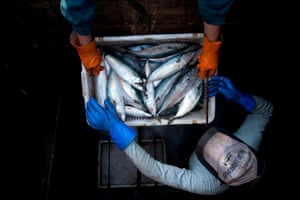Source: The Guardian
Author: Charles Clover
The UN has pledged to ensure healthy, productive oceans – but how can this be achieved when demand for fish has never been higher
hen I was in Senegal in 2003, the few Chinese vessels fishing along the coast from Mauritania to Liberia were unseaworthy rust-buckets, existing off what licences they could cadge.
Then in the past five years shining new trawlers appeared on the horizon, churned out by subsidised Chinese shipyards, earning their owners handsome subsidies if they travel outside China, where they run on subsidised fuel and exploit subsidised freight rates to get their frozen cargo back home. There seem to be unlimited funds available to buy licences to fish in ways that are far from transparent – and which have long been exploited by other Far East fleets and resourceful members of the European Union.
China’s distant water fleet is now the largest in the world, with about 3,400 vessels fishing in the waters of nearly 100 countries. Researchers estimate that nearly 75% of all the fish it caught came from African waters with almost 3m tonnes from west Africa.
And there is, as far as we can see, a problem. Scientists working for the University of British Columbia, using a new way of estimating the size and value of catches, reported this year that just 9% of the millions of tons of fish caught by the Chinese in African waters is officially reported to the UN. All nations have to report annual catches to the UN’s Food and Agriculture Organisation.
Once, if you wanted to understand how global trends in food consumption were affecting the health of the ocean, you would travel to different countries, stand on the fish dock and watch the boats come and go. Now you get a far better grasp of what is going on from a computer program that tracks fishing vessels by satellite. Focus in on west Africa and you will notice the extraordinary upsurge in the number of Chinese trawlers fishing there in the past four years. The program displays the routes of more than 400 industrial vessels, 220 of them from China – more than any other nation.

Zoom in on the coast of mainland China itself and you will understand why the Chinese fleet ranges across the world from the south Pacific to the Caribbean to bring home the shrimp, sole and tuna for home consumption. Along the shoreline from Hong Kong to Shanghai no sea is visible beneath the blue triangles denoting fishing vessels with their automatic identification system (AIS) switched on. Scientists reported in 2013 that 30% of China’s wild fisheries have collapsed and 20% were overfished.
No one can blame China for trying to feed its 1.35 billion people. But the way it does it is coming under scrutiny, for there are persistent allegations that its fleet is involved in illegal, under-reported or unregulated fishing. In west Africa, some 1.2m tons of fish are caught by 274,000 artisanal fishermen, often in direct competition with industrial vessels.
The result of this conflict is that stocks are in trouble all along the west African coast. Ghana recently had to propose a closed season of several months so fish could breed. The underlying problem is governance, or rather the lack of it. Under Ghanaian law, the beneficial owner of a fishing vessel is meant to be Ghanaian. The 60 licensed Chinese vessels in Ghanaian waters all fly the Ghanaian flag but the fish goes to China.
Stephen Akester, co-ordinator of a World Bank programme designed to improve governance and fish-stock management from Mauritania to Ghana, says the source of the problem lies in the custom of fishing companies buying licences through trawler agents who make payments to politicians that see this as their main source of income. The agency system means more fishing capacity gets licensed than stocks can stand, local fishermen lose out and, if landings are not measured properly, government loses tax revenue. When confronted for buying licences illegally, a Chinese diplomat told Akester, who is British, “You had your turn, this is ours.”
Read full article
